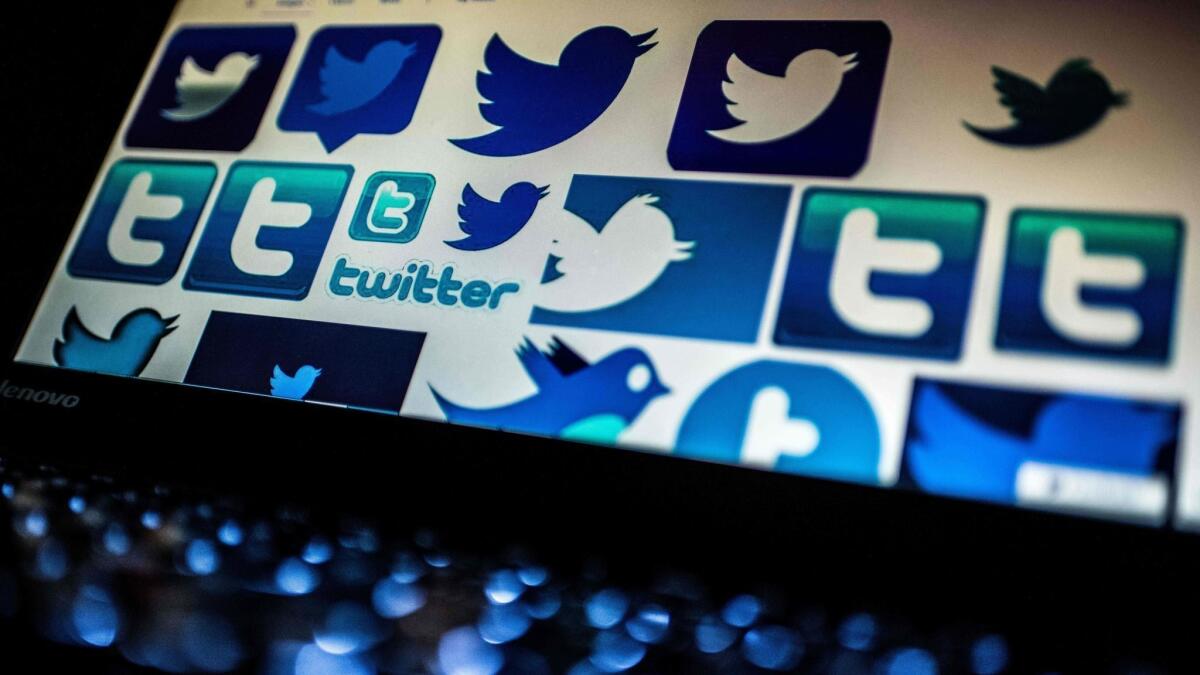Twitter removed accounts from overseas that targeted U.S. midterm election

Twitter Inc. revealed Thursday that it had removed thousands of malicious accounts â thought to have originated in Iran, Russia and Venezuela â for spreading disinformation online, including previously undisclosed efforts to target the 2018 U.S. midterm election.
In the months before American voters went to the polls, Twitter said, some of these campaigns with foreign ties sought to stoke social and political unrest around hot-button issues, echoing tactics that social media companies have spent two years trying to counter. The approach had been adopted by the Internet Research Agency, an organization with ties to the Russian government, two years earlier in an attempt to steer the 2016 presidential election in favor of Donald Trump.
Twitter said it removed 418 accounts believed to have originated in Russia prior to election day last November, but it declined to specify exactly when, and it said it could not definitively link the efforts to the IRA.
Similar tactics also had been put to use by operatives believed to be in Venezuela: Twitter said it has removed 764 accounts originating in that country that mimicked Russiaâs information operations. The company said it removed a majority of these accounts by November 2017, but some more-recently created accounts tweeted 50,000 times about the 2018 midterm election. Twitter said a second âstate-backed influence campaignâ found and disabled in Venezuela focused on that countryâs own citizens.
And Twitter confirmed that it found additional malicious activity originating in Iran, part of a campaign first unearthed in 2018 that sought to amplify political messages that had been broadcast by the countryâs state-run media. Twitter announced it removed more than 2,600 accounts believed to be tied to this network. Roughly a third tweeted in English, the company said, a small fraction of which touched on the U.S. election.
Foreign attempts to manipulate Twitter were âfar lessâ prevalent than in 2016, Carlos Monje Jr., the companyâs director of public policy, government and philanthropy in the United States and Canada, wrote in a blog post. He said the âmajority of these accounts were proactively suspended in advance of election day.â Twitter also revealed that it took action against nearly 6,000 tweets that sought to discourage voters from casting ballots on election day, many of which originated in the United States.
On one hand, Twitter said that the takedowns announced Thursday illustrate its progress two years after Russiaâs 2016 disinformation campaign reached hundreds of millions of social media users across the web. Like its peers in Silicon Valley, Twitter said it spotted threats far earlier, and limited their reach, as a result of investments in new staff, clearer policies around abuse and improved artificial-intelligence tools that can challenge fake accounts or suspect posts faster than human moderators.
But the breadth of its revelations â nearly three months after the election â also affirms that a wider array of malicious actors around the globe are borrowing from Russiaâs information-warfare playbook in a bid to destabilize the United States or push political narratives favorable to their governments. The pressure on Facebook Inc., Twitter and others to improve their defenses in response is likely to intensify as the 2020 presidential election draws near.
In total, Twitter estimated that the entirety of its users sent more than 99 million tweets between the first primaries in March until election day, the âmajorityâ of which came from âindividuals expressing their views,â Monje wrote.
For its part, Facebook said Thursday that it had removed a total of 783 accounts, pages and groups originating in Iran that masqueraded as foreign-language news sites to push political messages, including anti-Israel memes.
The most popular pages had millions of video views, hundreds of thousands of likes and tens of thousands of followers, according to an analysis by the Atlantic Councilâs Digital Forensic Research Lab. At least one page posting in English promoted anti-West themes, including a video watched more than 1 million times suggesting the Sept. 11, 2001, terrorist attacks were an âinside jobâ by the U.S. government, the analysis showed.
Previously, Facebook said two weeks ago that it had removed hundreds of pages that originated in Russia that appeared to be focused on regional weather and sports but actually served as a way for Russian state-owned media to secretly reach social media users.






